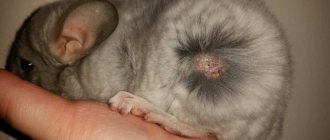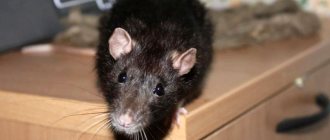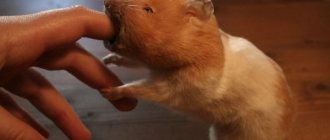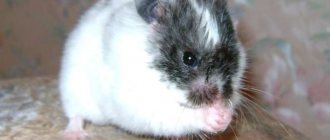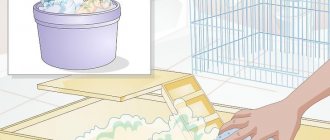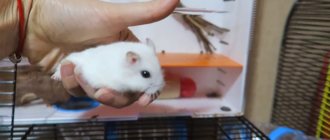If you're in the market for a new pet and have your heart set on a chinchilla, you should have a lot of questions. One of the first things to consider when considering any pet is whether it stinks or has a strong odor.
As it turns out, chinchillas are one of the cleanest pets!
How smelly are chinchillas? They rate about 2/10, much less smelly than other pets. They are self-grooming and hygienic, so they only smell if they are not cared for properly. Neglect, such as not dusting or cleaning your chinchilla's cage, can cause the smell of poop, urine, or bacteria. These problems are easy to fix.
Do chinchillas smell bad?
A chinchilla shouldn't smell bad. They are naturally clean animals: they frequently bathe and groom their own fur, as well as that of their cage mates. Their feces are hard and dry, and they rarely urinate as they like to conserve water. They eat hay that is dry so it won't spoil.
The only reason your chinchilla might smell is because you don't take good care of it. You often see this in rescued chinchillas that have been neglected. Rescued or surrendered chinchillas often have problems that never affect other chinchillas, such as lice, mites, very fine fur, and smelly fur.
Chinchilla amber: is it true or a myth?
If the animal is healthy, then there will be no aroma from it. Moreover, any chinchilla is quite clean, they have no sweat glands, and they shower themselves, in special sand. The diet of this rodent includes only dry food, so the excrement is also dry and cannot become a source of unpleasant odor.
Let's consider exceptions to the rules when an extraneous odor may appear: if there are a couple or more rodents, an unpleasant odor may arise during quarrels, thus the rodent expresses its dissatisfaction.
Rodent owners and experienced breeders believe that an unpleasant odor can occur if care is not followed and if the animal is sick. Other possible causes of the smell:
If the cage is dirty, the filler is saturated with urine (if timely cleaning, the smell does not cause inconvenience), leftover food and hay rot, the animal’s fur naturally absorbs these aromas. It is very difficult to get rid of such a smell, so you need to choose the right filler and change it on time.
Do chinchillas smell good?
By all accounts, chinchillas are supposed to be odorless. Their hard poop is dry to the touch, so there should be no odor. They protect their fur from fat and liquid, so it should not smell like anything.
Some owners find that their chinchilla smells sweet. This may be due to chinchilla hay, some types of which can have a sweet smell (and taste!).
If you pick up a chinchilla and bring it to your nose, you may not notice the smell at all. If your chinchilla has recently had a dust bath, he might smell like this; similarly, if she had recently rolled in the hay, she might smell the same way instead. But chinchillas have surprisingly little odor.
Eliminate odor
To effectively combat the occurrence of amber, it is necessary to establish the cause of its occurrence. It is worth putting things in order in the chinchilla’s house, replacing the used filler; today there are special not only absorbent fillers on sale, but also even eliminating odors. The next stage, changing the food, perhaps this particular food is not suitable for your pet and causes digestive disorders, pay attention to the quality and composition. Perhaps the tray is not convenient for the fluffy, try replacing it.
There are times when an animal is unable to clean itself, then the owner’s help is needed.
Do chinchillas have bad breath?
All animals have some degree of bad breath. This is because your mouth is naturally full of bacteria, even if you brush your teeth, use mouthwash and floss. It is constantly moist, closed on the outside, and has many tiny corners where bacteria can grow behind the teeth and in the back of the mouth. This problem can be made worse if the chinchilla also has some kind of infection in the mouth.
So, don't expect your chinchilla's breath to smell like roses. But it's no worse than the breath of any other pet (or smelly relative).
The only time his breathing might be worse is if he has an infection in his mouth. This can happen if a chinchilla's teeth overgrow and cut into the gums, causing open sores that then become infected. If this happens, take your chinchilla to the vet.
Is there a smell from animals?
Chinchilla lovers unanimously say that the animals are clean and are not capable of emitting an unpleasant odor. This feature usually manifests itself due to improper care, the development of diseases, and stress.
Features of care:
- The tray is cleaned every two days. If possible, it is recommended to do the procedure daily.
- Once a week, the cage is wet cleaned. The bottom is doused with boiling water, killing harmful bacteria.
- The water in the drinking bowl is changed daily. The tanks are washed every other day.
- The sawdust in the chinchilla's house is changed twice a week.
To prevent the development of diseases, feeders are checked several times a day. Only fresh food is placed in them, old food is thrown away. Stale food can lead to the development of gastrointestinal diseases.
To clean their teeth, rodents are given special chewy treats at least once a week. They help slow down the decay process.
Lack of hygiene leads to the development of an unpleasant odor. Chinchillas need to be bathed. Swimming is not easy, special volcanic sand is used. Sold in all pet stores. It is not recommended to use quartz sand, as it can damage the skin of a rodent. Bathing is carried out according to the instructions:
- Pour volcanic sand 5 cm thick into the container.
- Place the bath in your pet's home.
- Wait until the procedure is completed.
The procedure allows you to:
- get rid of excess moisture;
- restore emotional state;
- get rid of unpleasant odor;
- clean the wool from debris;
- comb out loose hair.
Chinchilla owners are advised to weigh their rodents weekly. Stable or gradual weight gain indicates good health. A sharp decrease signals the development of diseases or stress. When moving a new animal into a cage, lemon balm is added to the food. It normalizes the functioning of the nervous system.
Why does my chinchilla stink?
There are two main reasons why your chinchilla smells bad. The first is the chinchilla's thick fur, and the second is its cage. Both of these problems can be corrected with proper care. Your chinchilla may also smell bad if he is sick, but this is not as common.
Dirty bedding (smell of a dirty chinchilla cage)
Chinchillas need to go to the toilet just like any other animal. This is not something they can do to help. Chinchillas are actually much cleaner than other animals in this regard: they choose a corner of the cage to pee (and can be toilet trained), and their poop is hard and small, so it shouldn't smell bad.
The problem is that you are not cleaning your pet's cage often enough. Bedding soaked in urine develops bacteria and starts to smell; feces can accumulate and break down when wet and can also start to smell. You will notice this typical dirty cage smell if you have had small pets in the past.
Chinchilla hay gets wet
Your chinchilla's hay may also give off a cage odor. The hay itself should not smell bad; it's dried herb. It won't work if it's dry, but hay can be stored for years in the right conditions.
But many chinchillas eat in a way that causes a lot of mess. They take the hay, eat it and throw it away. After a moment they will take another piece of fresh hay and bite into it. Soon the floor of the cage is littered with old hay.
If the cage stays dry, this is not a big problem. But if the hay gets wet, the bacteria in the bedding will start to feed on the hay and it will stink. This is the main smell that people associate with small pets such as chinchillas.
The smell of dirty chinchilla fur
Another scent is your chinchilla's fur. The chinchilla's fur is thicker than that of any other animal, with about eighty hairs per follicle. Humans have no more than two or three hairs per follicle, which shows how thick chinchilla fur actually is.
The downside to such beautiful fur is that once it gets wet, it stays wet unless you hand dry it. This may cause:
- Fungal infection. Fungus loves warm, moist conditions, and invisible spores float around your home even if you keep it clean.
- Bacteria. Bacteria, like fungi, love moist and warm conditions, like wet chinchilla fur.
Chinchillas go to the toilet in one corner of the cage. But if you don't change their bedding often enough, they may accidentally sit down or walk in urine and stain their fur.
You will not notice any greasy sweat odor. Chinchillas do not have sweat glands, and dust baths remove oil from their fur.
Smelly chinchilla poop
Chinchilla food should not stink. It should be hard and dry, which means there will be no unpleasant odor. But chinchillas may have intestinal problems that cause them to have diarrhea, in which case they may experience an odor. It will smell like any food.
Feces will also smell bad if left in the cage for too long. Bacteria in the cell destroy it, which happens even faster if it gets wet.
Your chinchilla is sick
Last but not least, your chinchilla may smell bad because he is sick. Bad odor causes many health problems, the most obvious of which is infection.
When an open wound becomes infected, the bacteria inside it multiply. As they do this, they produce the instantly recognizable smell of missing food/wounds. It shouldn't be an obvious smell from a distance (like urine), but you will notice it up close. Chinchillas can become infected with:
- In eyes. Eye infections such as conjunctivitis do not smell unless they get very bad.
- In the mouth. Chinchillas can develop open, ulcerated sores because their teeth become too long.
- All over the body. When chinchillas fight aggressively, they bite and can cause bite wounds.
Health problems
If you are sure that it is the chinchilla that smells, and not its uncleaned cage, this is a reason to contact a veterinarian. The appearance of an unpleasant odor, either from the animal itself or from its fresh feces, is a symptom of the development of some disease in the rodent’s body. What the disease is associated with can be preliminarily determined by the source of the unpleasant odor:
- if your breath smells, there is damage to the teeth or their roots;
- if feces smell, there are problems with the gastrointestinal tract, intestinal infections or diarrhea (even chronic form);
- if the urine smells (precisely fresh, and not just not collected on time) - disruption of the urinary system and its organs;
- if the female’s loop smells after giving birth, this is evidence of complications that arose during the delivery process (internal bleeding, stuck dead fetus, etc.).
If it is the animal’s fur that smells, this is not a sign of another disease, but external contamination of the fur with smelly feces. Again, you need to try to determine what is the source of the unpleasant odor - urine or feces.
Only a veterinarian can make an accurate diagnosis. If you notice an odor coming from your chinchilla, it is better not to hesitate to consult a doctor.
Are chinchillas dirty?
Chinchillas can also damage their cage. If you don't clean it, it will contribute to the overall smell.
Chinchillas generally scatter their food randomly. But chinchillas can also accidentally get dirty, for example by dripping water from a bottle on themselves.
Also, some chinchillas are dirtier than others. While most chinchillas choose a corner to pee and then only pee there, other chinchillas don't bother. They pee anywhere: in any corner, on any platform, even outside the cage! These chinchillas smell more than usual.
Chinchilla in the house: pros and cons
Chinchillas' natural habitat is the harsh, desert highlands of the Andes. So that the animals can retain warmth and energy, nature gave them fluffy coats, on one square centimeter of which 25,000 hairs fit. Since ancient times, the valuable fur of rodents has been a luxury item, available to leaders, kings and kings. Because of him, chinchillas paid with their population; there are very few of them left in nature, which is why the animals are listed in the Red Book. What saved chinchillas from complete extinction was that from 1919 to 1921, the American enthusiast Matthias F. Chapman caught eleven individuals. He laid the foundation for the breeding of rodents in captivity. The animals, thanks to their friendliness and ease of keeping, quickly found a place in the hearts of animal lovers.
Reasons for chinchilla
1. If you are a busy person and cannot devote much time to your animal, then a chinchilla is what you need. This is an independent animal that can easily live without the increased attention of its owner.
2. If you are leaving, there is no need to look for somewhere to “place” the animal, frantically calling friends and relatives. A chinchilla can wait for your return home for a week without any problems. Of course, if you have enough water and food.
3. If you work the day shift and only come home in the evening, then your rhythm of life coincides with the rhythm of life of a chinchilla. After all, she is a nocturnal animal and sleeps during the day, the peak of her activity occurs in the evening.
4. Try not to clean the cage of a hamster or guinea pig in time, and they will immediately remind you of this with a specific “aroma”. The chinchilla does not emit any odor because the animal does not have sweat or sebaceous glands. The only thing it smells like is sawdust.
5. Chinchilla is a ball of fluffy tenderness. Their fur is extremely pleasant to the touch. Once you touch it, you will want to touch it again and again. Having stroked an animal once, you will never confuse this feeling with anything else.
6. You will never encounter a problem with parasites (fleas, ticks) on your pet. After all, chinchilla fur is so thick that not a single insect can live in it.
Do chinchillas have scent glands?
Many animals have scent glands, which they use to mark territory or emit warning odors. Chinchillas too. These scent glands are found on the chinchilla's buttocks.
Your chinchilla may smell from these glands when he is scared or overstimulated. People report that it smells different: some think it smells like burnt nuts/almonds, others say it smells like vitamins. Others think it smells like concentrated urine, others say it's a paste. The exact smell may be related to the chinchilla's diet or other factor, so it is not always the same.
This odor is not a serious problem. Firstly, the smell is extremely unpleasant and the smell will go away on its own. But you will also smell it infrequently and only when you accidentally startle your pet, for example by picking him up when he doesn't want you to or making a sudden loud noise.
How to deal with a specific aroma
The first step to eliminating an unpleasant odor is to determine its source and cause. First of all, you need to find out whether the stink is from the pet’s cage or from the animal itself. If the source of the stench is the home of a furry pet, you urgently need to carry out a general cleaning of the cage, and in the future, carry out cleaning, if not more often, then at least on a regular basis, and not when it already stinks again.
During cleaning, you should also check whether the tray is suitable for the animal, and if necessary, replace it with a more convenient model (you can even use rectangular glass baking dishes for this purpose). The most suitable tray filler for a chinchilla is absorbent granules produced specifically for cats. Their structure ensures complete absorption of not only liquids, but also odors.
Of course, after cleaning, you need to additionally clean the unfortunate animal that lived in the mud - “everyday” swimming in the sand will not help here. If the smell from your pet is not due to external contamination, you should contact a veterinarian as soon as possible for examination. Once the chinchilla is healed, the smell will disappear on its own.


